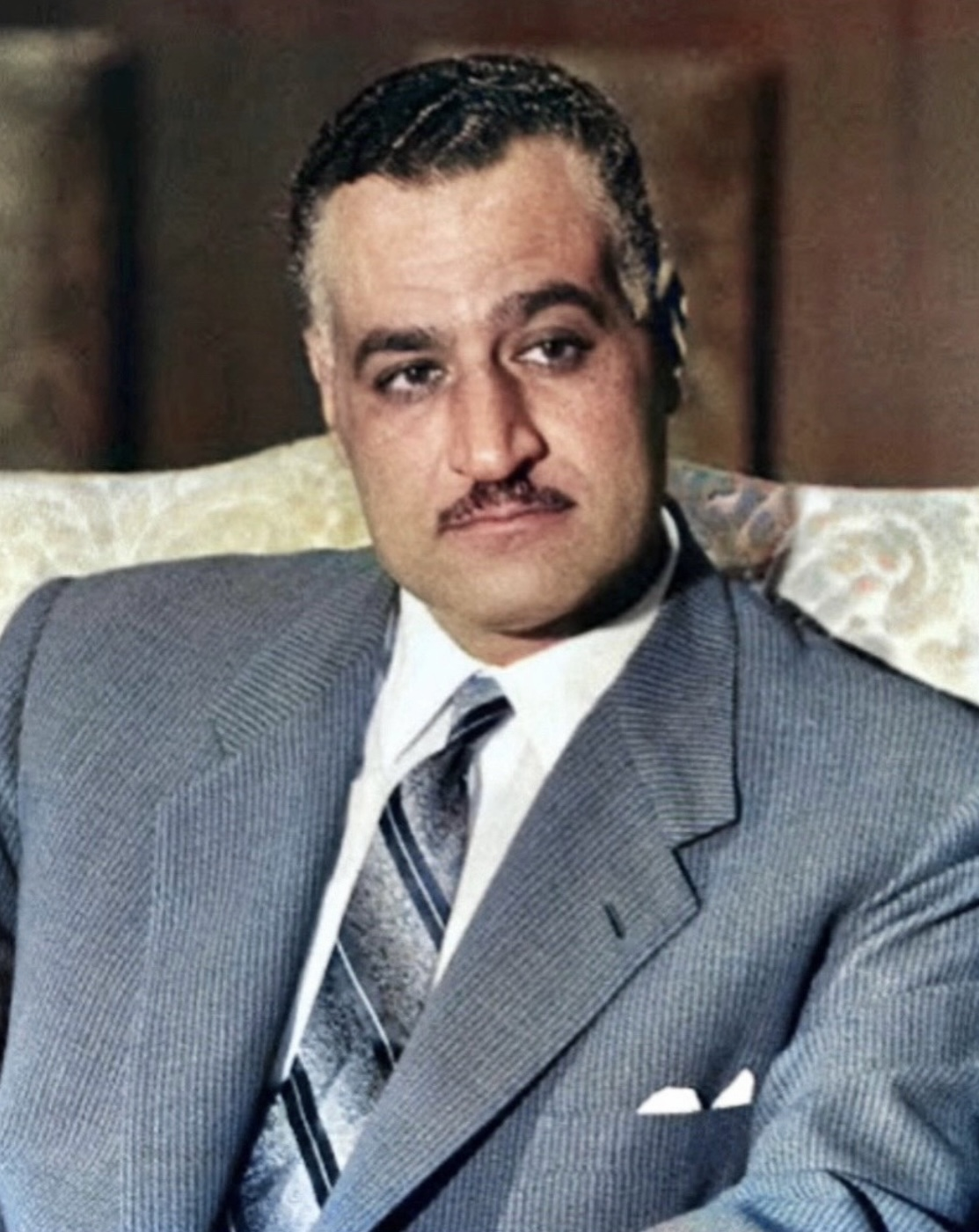(Alexandria, 1918 - Cairo, 1970) Egyptian politician and military man, president of the Egyptian republic between 1954 and 1970. Son of a postal official, he attended elementary school in al-Khatatibah, a village in the Nile delta to which he had been assigned. He continued his studies in Cairo and took part in frequent anti-British and anti-monarchist demonstrations, which led to his first imprisonment at the age of seventeen on charges of conspiracy. After secondary education and a brief stay in a law school, in 1937 he was allowed to enter the Royal Cairo Military Academy and three years later graduated as a second lieutenant.
In 1948 he fought in the war against Israel before being taken prisoner, and subsequently served in Sudan, then under Anglo-Egyptian condominium. Nasser, then a commander, established contact with other young officers, equally dissatisfied with the defeat of the Arab armies against Israel and the incompetence and corruption of the reigning monarchy, and in 1949 they formed the clandestine revolutionary organization of the Free Officers.
Nasser and his comrades, inspired by a burgeoning Arab nationalism and the political action methods of the Muslim Brotherhood, matured their conspiracy to overthrow the regime of King Farouq I. On the night of July 22, 1952, the Committee of Free Officers successfully led a bloodless coup d'état that would inaugurate a cycle of similar revolutions in the Arab world. Nasser, already with the rank of colonel, assumed the leadership of the Council of the Revolution and the command of the Armed Forces, while General Muhammad Naguib, nominally the leader of the movement, took the leadership of the Government and, from 1953, also the presidency of the new Republic.
On July 18, 1953, Nasser was appointed Deputy Prime Minister and Minister of the Interio. A power struggle started between Naguib, a moderate in favor of an agreement with the Western countries and of recovering liberal sectors of the monarchy, and Nasser, in favor of initiating a pan-Arab nationalist movement against Israel and of adopting neutralism vis-à-vis the superpowers, ended in favor of the latter, who on February 25, 1954 became head of the Government and on November 14 definitively dismissed Naguib and assumed the presidency of the Republic.
On June 23, 1956, Nasser submitted to a popular referendum a constitutional project that turned Egypt into a single-party Arab socialist republic (the National Union, created by decree on May 28, 1957), with a strong presidential system and ran as the Presidential candidate. Nasser's nomination for the post and the new constitution were put to public referendum on 23 June and each was approved by an overwhelming majority. The constitution granted women's suffrage, prohibited discrimination by sex, and entailed special protection for women in the workplace.
The foreign policy of the new Nasserist Egypt took a radical turn. On February 5, 1955, the Yugoslav leader Josip Broz “Tito” received him in Brioni to explain his proposal for a third world bloc of non-aligned countries. Nasser was one of the most prominent participants in the famous Bandung Conference (April 18-24, 1955), and on July 17-21, 1956 he met again with Tito in Brioni together with the Indian Prime Minister Jawaharlal Nehru; thus the trio of great leaders of the Third World was defined until the mid-sixties.
Nasser's great dream was to unite the divided Arab peoples under Egyptian leadership, Defeat the Zionist Proyect, and to achieve Egypt's true independence, both in the political and economic fields. Nasser developed the agrarian reform (launched on September 8, 1952) and subjected economic activity to the State. He personally led the negotiations with the United Kingdom for the withdrawal of its troops from the Suez Canal, concluded with an agreement on October 19, 1954.
The mainstay of the development projects was the great dam of Aswan, at the first cataract of the Nile, in order to produce the electricity necessary for the modernization of the economy and to gain land for cultivation in the desert. He initially approached the World Bank, the United States and the United Kingdom for funding. On July 20, 1956, the American government cancelled its offer of aid on the grounds that the Egyptian leader had included the Soviets in the enterprise, a decision that was seconded by the British government the following day.
Nasser's response to the Western boycott was spectacular and caused an international earthquake: on July 26 he announced in a speech in Alexandria the nationalization of the Suez Canal and the continuation of the Aswan project without the requested funds. Nasser thus in the process won the enthusiastic support of the Arab masses, making him the champion of the emerging Third World. But his bold gamble had very serious economic and strategic implications for the United Kingdom and France, the main shareholders of the Canal.
Alarmed, the British and French governments secretly negotiated with the Israeli government the organization of a joint attack against Egypt to get rid of Nasser, their common enemy. The military plot was decided at a conference in Sêvres on October 22-24.
The Israeli offensive began on October 29 with a surprise attack that made great progress in the Sinai and penetrated to the vicinity of the Canal at Ismailia. On the 30th London and Paris presented their ultimatum, Egypt rejected it and the next day the Allies began bombing Egyptian airfields and sent paratroopers to Port Said and Ismailia, joined by Suez on November 5.
Nasser had no chance of defeating his attackers militarily, but international outrage and joint U.S. and USSR pressure for a cessation of the intervention played in his favor. The UN demanded Allied withdrawal and recognized Egyptian sovereignty over the Canal, a cease-fire was reached on November 6, and on December 22 the Franco-British expeditionary force re-embarked. Nasser completed his victory the following year with the Israeli withdrawal from the Sinai, once Israel had obtained (March 29, 1957) the lifting of the naval blockades of Suez and Akaba.
The years immediately following the Suez crisis marked the apogee of Nasserist Egypt and the strengthening of collaboration with the USSR. Political forces and military movements took up the rais' pan-Arabist and socialist discourse in other countries of the region. On February 1, 1958, Nasser and his Syrian counterpart Shukri al-Kuwatli announced in Cairo the union of the two countries into a single state that took the name of the United Arab Republic (UAR), which was joined by Yemen on March 2. However, discontent soon arose in Syria over Egyptian centralism the strongly centralized Egyptian state imposed Nasser's socialistic political and economic system on weaker Syria, creating a backlash from the Syrian business and army circles and on September 28, 1961, a military coup d'état in Damascus led to the separation of the country. Egypt kept the name United Arab Republic until 1971
In 1958 he made a triumphal three-week tour of the USSR; in Moscow's Red Square he reviewed the May Day parade together with Nikita Khrushchev. In 1964 he received the USSR's highest decoration, Hero of the Soviet Union, which had never before been awarded to a foreigner. Although the honeymoon with Moscow was not free of serious frictions, the fact is that Egypt received 43% of all Soviet aid to the Third World between 1954 and 1971.
At the beginning of the sixties Nasser accentuated the state and socializing of the economy, extended the nationalizations to the banks and the national insurance companies and to the shipyards and various industrial enterprises (July 1961), and decreed a second agrarian reform (1962). On March 21, 1962, the National Union was replaced by the Arab Socialist Union as the only party and defined the socialist principles of the Republic.
Cairo and Alexandria were the scene of numerous conferences of statesmen who took stock of the progress of the Arab union and designed strategies for action against Israel. In 1964, the Palestine Liberation Organization (PLO) established its first headquarters in Cairo, and on May 13, 1964, he achieved a great success with the inauguration of the Aswan Dam, built with Soviet aid, which entered service in 1968.
Repeating the escalation of 1956, on May 17 he demanded from the UN the withdrawal of the UNEF blue helmets (which since 1957 had stood between the two armies in the Sinai and Gaza), closed Akaba to Israeli shipping, deployed troops on the border and fortified the defenses of Sharm El Sheik, at the southern tip of the Sinai Peninsula, opposite the Strait of Tiran and the exit to the Red Sea.
Believing that an attack was imminent, on June 5 Israel launched an offensive that in the first hours destroyed the Egyptian air force in its airfields and overwhelmed the ground defenses of the Sinai. On the 8th the Israeli units completed the occupation of the peninsula and reached the Canal at three points, Port Said, Ismailia and Suez. In four days of fighting the Egyptian army had been disrupted. The best Egyptian troops - 40,000 men - were fighting in Yemen and could not arrive in time.
Nasser, who had always insisted that he would not enter another war with Israel until the conditions of Arab military superiority and unity and the diplomatic isolation of the Zionist State were met. But on the 9th, overwhelmed by the disaster, he publicly accepted his responsibilities and put his position at the disposal of the country, which was not accepted by the Parliament and the population, which again acclaimed him in massive demonstrations. However, after the defeat in the Six Day War, Nasser would no longer be the same.
On July 17, 1970, he accepted the U.S. Rogers Plan, which established a commitment to accept UN Security Council Resolution 242, a 90-day cease-fire in the Canal and its eventual demilitarization in a 20-kilometer strip, as well as its reopening to naval traffic. Nasser had found on his trip to Moscow the previous June 29 that the Soviets made the delivery of arms conditional on his acceptance of the plan.
Nasser's final service to the Arab nation was his mediation of the Jordanian Black September, the bloody civil war between the Hashemite army and the Palestinian fedayeen of the PLO. On September 27, 1970 in Cairo he got King Hussein of Jordan and Yasser Arafat to sign a cessation of hostilities, but despite his broad smile during the act, a gesture that always accompanied his exuberant personality and imposing physique, Nasser was exhausted and the next day, September 28, a fulminating heart attack ended his life. On October 1, five million Egyptians paid tribute to their departed leader amid scenes of hysteria, a mourning that was maintained in many countries of the Middle East, Africa and the Islamic world in general.
Hexbear links
- 🐻Link to all Hexbear comms
- 📀 Come listen to music and Watch movies with your fellow Hexbears nerd, in Cy.tube
- 🔥 Read and talk about a current topics in the News Megathread
- ⚔ Come talk in the New Weekly PoC thread
- ✨ Talk with fellow Trans comrades in the New Weekly Trans thread
- 👊 Share your gains and goals with your comrades in the New Weekly Improvement thread
- 🧡 Disabled comm megathread
reminders:
- 💚 You nerds can join specific comms to see posts about all sorts of topics
- 💙 Hexbear’s algorithm prioritizes comments over upbears
- 💜 Sorting by new you nerd
- 🌈 If you ever want to make your own megathread, you can reserve a spot here nerd
- 🐶 Join the unofficial Hexbear-adjacent Mastodon instance toots.matapacos.dog
Links To Resources (Aid and Theory):
Aid:
Theory:




